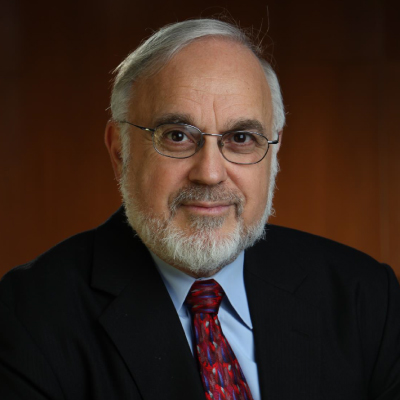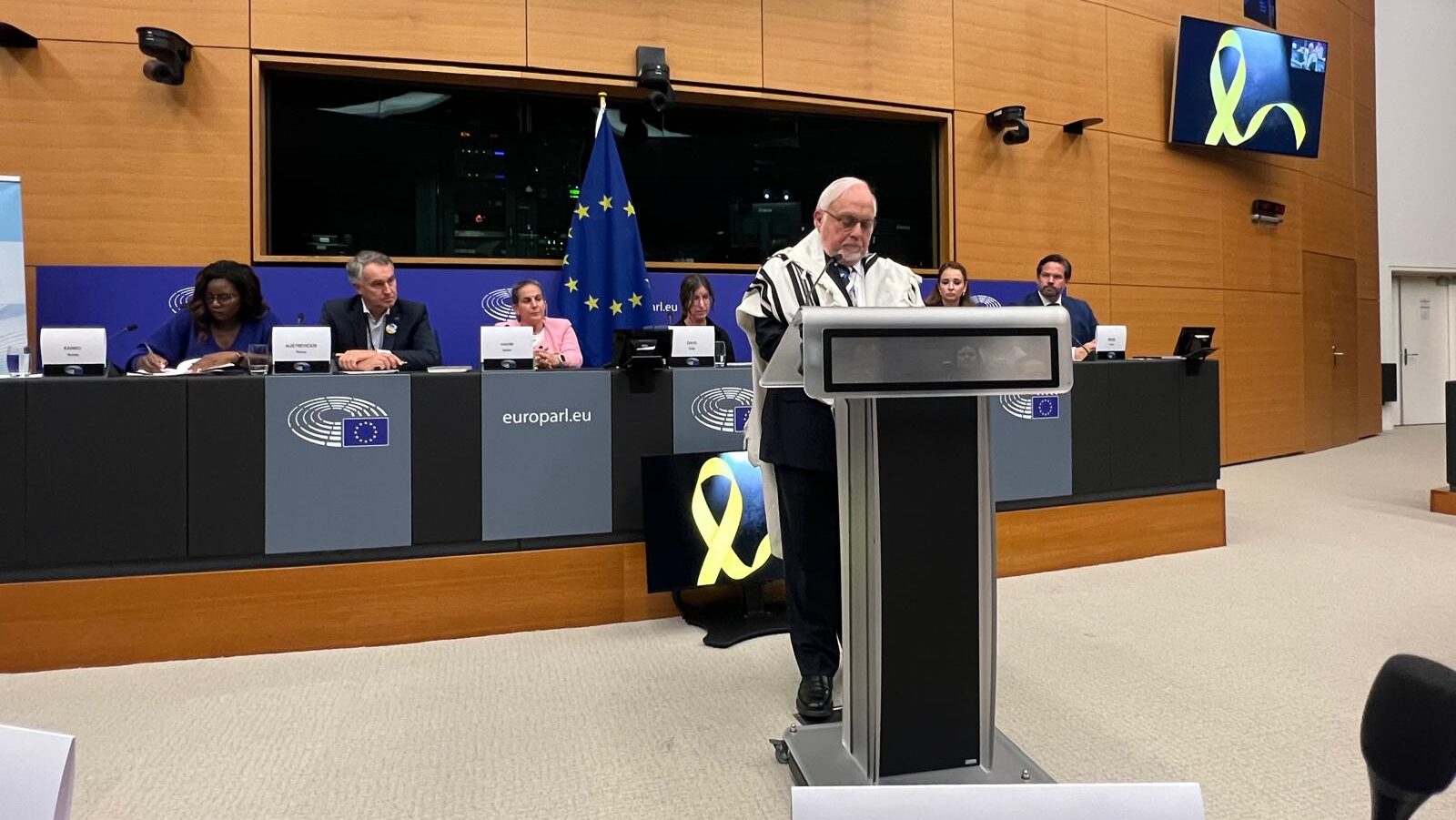This Yom Kippur, the ‘Al Chet’ of Denial Hangs Over the Whole World
The Al Chet prayer, part of Vidui (the Jewish confession), is one of the bedrocks of Yom Kippur services. Al Chet literally means “for the sin.” In this prayer, we Jews self-indict for the many ways we may have transgressed during the previous year, tapping our hearts after verbalizing each charge and then throwing ourselves on the mercy of the Heavenly Court.
Among the confessions, one of the top 10 most significant is: “…for the sin which we have committed before You through speech.”
This Yom Kippur is like no other. The pogrom on October 7, 2023, the over 100 hostages still enduring unimaginable suffering at the hands of Hamas’ monstrous leader Yahya Sinwar, and the multifront war spreading through Gaza, Lebanon, and from the Houthis to Iraq, all trace back to Iran.
These assaults target our families and our Judaic and Zionist values; public displays of Jew-hatred have extended beyond campuses into workplaces, medical clinics, and even outside our houses of prayer and assisted living facilities. Our enemies, both collectively and individually, aim to undermine our self-belief and the eternal promise that our greatest days are still to come. Antisemitism spreads globally, from genocidal slogans to the relentless subculture of hate on social media.
Throughout these challenges, the Jewish people—often led by the untested younger generation—have risen to confront our enemies. This Yom Kippur we beg God to guide us to safety and victory.
Yet, one question looms over us, a storm that lingers.
On October 7, 878 civilians were murdered in southern Israel, marking the largest number of Jews killed in a single day since the Nazi Holocaust.
During the Simchat Torah festival on a Sabbath morning, Hamas terrorists—trained, armed, and backed by Iran—killed 578 men, 300 women, and 53 children, including four under the age of 3 and two between the ages of 3 and 5.”
That day, 921 Jewish children were orphaned—some witnessed their parents being tortured and killed. In Israeli communities near Gaza, 119 parents saw their loved ones, including children, murdered in their homes. The peaceful Nova Festival became a scene of horror, with killings, rapes, mutilations, kidnappings, and hostage-taking involving people of all ages and nationalities.
The October 7 crimes were livestreamed by terrorists, who boasted in phone calls to their parents about killing Israeli women, children, and men with their bare hands. Their acts of brutality, including the mistreatment of hostages—both living and deceased—were paraded through Gaza City.
How could the civilized world, including leading international agencies and NGOs committed to protecting women and children, witness such evil in real time and, instead of acting, turn away, even questioning or denying the crimes?
Give the gift of hope
We practice what we preach:
accurate, fearless journalism. But we can't do it alone.
- On the ground in Gaza, Syria, Israel, Egypt, Pakistan, and more
- Our program trained more than 100 journalists
- Calling out fake news and reporting real facts
- On the ground in Gaza, Syria, Israel, Egypt, Pakistan, and more
- Our program trained more than 100 journalists
- Calling out fake news and reporting real facts
Join us.
Support The Media Line. Save democracy.
From October 8 onward, denial of these horrific crimes became a plausible, even accepted, narrative.
How in God’s name was it possible to deny on October 8 what the world witnessed on October 7? Where did Hamas learn such a strategy, and to what end?
The roots of this denial trace back to the last century, to history’s greatest crime—the Holocaust.
For if you can deny the Shoah, you can deny anything.
Arthur Butz, an associate professor of engineering at Northwestern University in the 1970s and 80s, was a Holocaust denier. His infamous book, The Hoax of the Twentieth Century, led to a CNN interview. When shown footage of the death camps and Nazi atrocities, the broadcaster challenged him: “How can you deny Auschwitz?” Butz’s response revealed the truth:
“I don’t believe there were gas chambers because I am more comfortable believing they didn’t exist,” the Holocaust denier responded.
Butz’s denial of the Shoah, and the media platform he and other deniers gained, sowed the seeds for using denial as a weapon. Neo-Nazis and antisemites eagerly seized the opportunity, painting Holocaust survivors as liars, dismissing evidence against Nazi war criminals as Cold War forgeries, and framing the martyred 6 million Jews as part of the greatest hoax of the 20th century.
Beyond antisemitic tropes, weaponized denial of the Shoah also became precursors of future atrocities.
In 1991, as the Soviet Union was on life support, an elderly Soviet Jew visited me in my Moscow hotel room. He handed me a yellowed booklet listing Soviet Jews who had earned the Order of Lenin, the highest honor for valor in the epic war to defeat Hitler’s Germany. He explained that Stalin had ordered the execution of the Jewish historian who compiled the information because the findings highlighted the significant Jewish contribution to the war effort. When I asked why, he replied, “Stalin planned to eliminate the Jews, and this information would have generated positive sentiment toward them among Soviet citizens.” Stalin’s sudden death in 1953 ultimately thwarted his genocidal plan.
Iran’s nefarious regime made Holocaust denial an official state policy, even organizing cartoon contests that rewarded the most malicious depictions of Jews, both living and deceased. While denying the Holocaust, the ayatollahs also flipped the narrative, accusing Israelis of being Nazis and promoting a vision aligned with Hitler’s dream of a Judenrein world.”
These hateful ideas found new life and massive audiences on social media. The underlying message of the big lie was: If your neighbors are modern-day Nazis, they become a legitimate target for vilification, violence, or worse.
So, denial of the Shoah has been weaponized, serving as a precursor for further atrocities built upon the ashes of the past.
This leads us to one last example from the Shoah that speaks to another central theme of Yom Kippur: justice.
From the earliest days of the Third Reich, Nazis manipulated the rule of law to strip Jews of their rights, including freedom, citizenship, education, housing, and ultimately, their lives. The concept of justice was entirely perverted. Simon Wiesenthal once told me that his main reason for pursuing trials against Nazi war criminals, even when they would result in no more than life sentences, was to rehabilitate the fundamental principles of justice in a world that had nearly lost them.
Mr. Wiesenthal must have felt pride in witnessing the establishment of international tribunals to address genocides and crimes against humanity in Africa, Europe, and Asia.
But since October 7, the world again is witnessing the perversion of justice by the ICC and ICJ, rigged to demonize Israel as it defends itself against Hamas terrorists—who, despite their crimes against humanity, are rarely indicted.
This hijacking of human rights to vilify Israel has fueled rampant antisemitism on both sides of the Atlantic, supported and legitimized by the International Red Cross, numerous UN agencies, and NGOs both in the US and Europe.
At the end of this horrific chapter, we Jews, if we don’t lose our focus and courage, will emerge stronger and ready to face the future—despite the opposition of the UN, the EU, and the resurgence of “death to the Jews” chants on the streets of Germany.
In the end, we Jews alone cannot defeat antisemitism; only our neighbors, through the rule of law and mutual respect, can counter history’s oldest hatred. If the world’s democracies choose not to confront evil, history has repeatedly shown that inaction leads to disaster. Denying the scourge of antisemitism sets the stage for a dark future—one no one wishes to leave for our children. This Yom Kippur, we recharge spiritually and renew our commitment to work with people of goodwill to build a better future for all. That is the Jewish way. Yom Kippur, with its solemn prayers, illuminates the path of justice and compassion. The nations of the world should take heed, for Yom Kippur is when the fate of the world is sealed.
Denial is a weapon—a precursor to catastrophes. Confronting evil ensures that future generations will have a legacy they can be proud of and emulate.
On Yom Kippur, we chant, “Who will live and who will die.” The choice between good and evil is a challenge for all humanity. We pray that the world will make the right choices, for themselves and for us.




